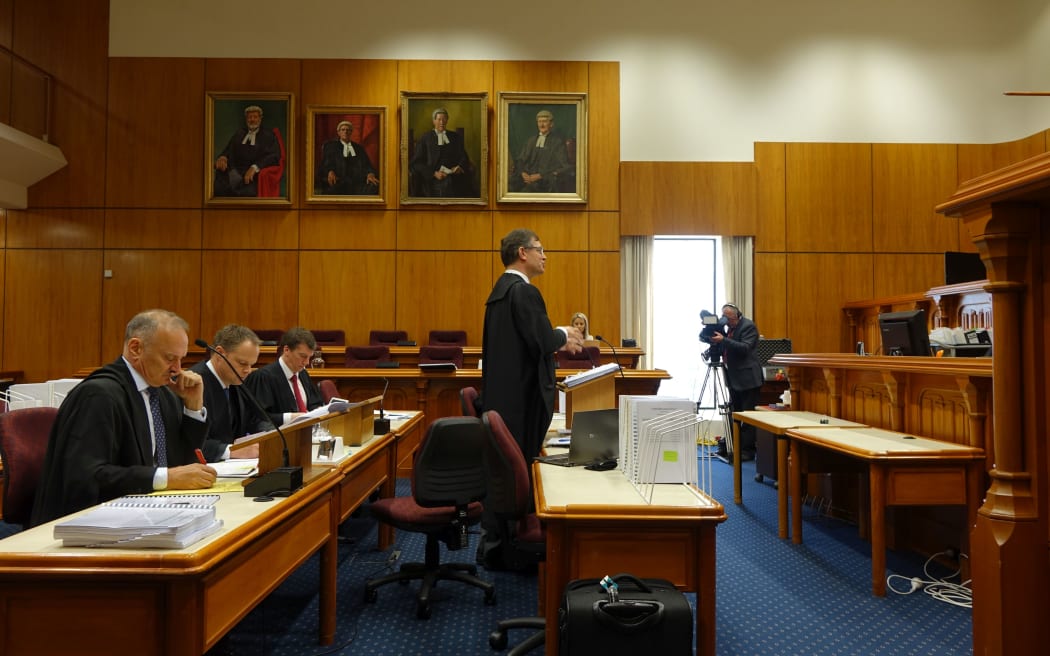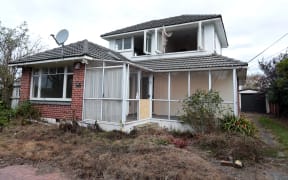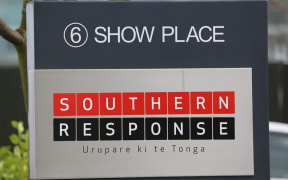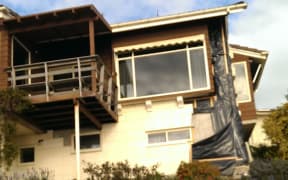A group of Christchurch homeowners say they have been left living in broken homes and have been forced to take their earthquake insurer to court.

Francis Cooke QC, centre, speaks for the group of disgruntled homeowners in the High Court in Christchurch. Photo: RNZ / Maja Burry
The High Court in Christchurch heard a submission from the group of 40 customers this morning, as they sought to take a class action against Southern Response.
The company was set up to settle outstanding AMI claims when that insurer went bust.
This morning, the group's lawyer Francis Cooke QC told the court the homeowners could not afford to take individual action.
Mr Cooke alleged the insurer systematically under-estimated relevant costs and the scope of the work required on the homeowners' houses.
"Southern Response has embarked upon a deliberate approach, to minimise its overall liability," Mr Cooke said.
Southern Response's lawyer Mark O'Brien QC rejected that claim in his submission this afternoon, calling it bold and extravagant.
"It's sure to capture attention, it may assist in garnering support for a wider group, but in our submission it really won't go anywhere and ultimately it won't help resolve any of these claims that are currently unresolved, which Southern Response would very much like to get resolved."
It said class action would only delay the resolution of each individual customer's claim and create inefficiencies.
Claims still not settled
Outside court today, Christchurch resident and Southern Response customer Chris Webber said his North New Brighton home was damaged beyond repair in the 2011 earthquakes.
Mr Webber said internal documents from his insurer showed the house should be demolished completely and have its foundations rebuilt - but Southern Response was still suggesting it was a patch-up job.
He said its inability to act reasonably had left him and his son living in a broken home.
"My son's nearly at high school now, he can barely remember what the house looked like beforehand, so it is depressing, you come home everyday, you see it's [the house] busted everyday. It sort of almost makes you want to give up.
"I'm one of those people, I want to question everything to make sure that what I'm hearing is true, but unfortunately what I'm hearing from Southern Response is far from true."
Mr Webber said he needed class action to be taken against Southern Response, because he could not afford to do it alone.
Brian Kinder, another of the policy-holders attempting to take the class action, had a full replacement policy with AMI.
Southern Response picked it up, but he was still waiting for settlement.
He said that more than five and a half years after the February earthquake, he had hit the wall in terms of his ability to progress any further with Southern Response.
"It was just becoming too overwhelming and all-encompassing. It's been a long, long process. They have continually been making low offers.
"I'm an engineer by trade, I kind of know when things are straight and when things are bent."
Tony Yeadon, another of the policy-holders in the case, said the difference between what Southern Response offered him and what independent assessors have told him a full repair to his home would cost was $600,000.
Mr Yeadon said things started going wrong from his earliest dealings with Southern Response.
The policy specified "full replacement and full repairs", but he was left with a cold, draughty house with large gaps under the door, he said.
"But we're still there because we've got nowhere else to go to ... That's all we want - a nice, safe house that's repaired and that we feel comfortable and warm in."
Southern Response said in a statement that both Mr Kinder and Mr Yeadon's earthquake claims were complex, with multiple issues to work through.
"We are working with all the external parties they have engaged, and continuing to try and settle their claims through their lawyer as best we can," it said.
"Since the original proposed class action was launched in April 2015, we have successfully settled 1826 claims.
"To date we have settled just under 80 percent of our nearly 8000 over-cap claims."





